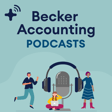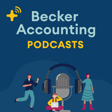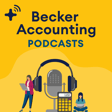
Cool Careers in Accounting Ep. 19 - From CFO to Whistleblower with Andrew Jordan
Andrew Jordan, CPA, recounts his remarkable path from valedictorian and Big-Four-style tax staffer to tech-company CFO turned whistleblower. In this candid conversation with host Mike Potenza, he explains how uncovering a fabricated Walmart contract led to an FBI fraud case, the collapse and turnaround of the business, and his eventual launch of Jordan CPA Services. Jordan discusses career setbacks, ethical dilemmas, leadership lessons, and advice for aspiring accountants seeking meaningful, balanced careers.
Earn CPE by listening to this podcast through a Becker Prime CPE subscription.
Listen to this episode through your Becker LMS platform to complete practice questions, pass the final exam, and earn CPE credit.
Already a Becker Prime CPE customer? Login here.
Have access to Becker CPE through your employer? Earn CPE credit for this podcast however you consume Becker CPE, either through your company’s LMS or via the Becker platform. Not sure where to log in? Check with your CPE admin.
Learn more about CPE Podcasts from Becker: https://www.becker.com/cpe/becker-podcasts


